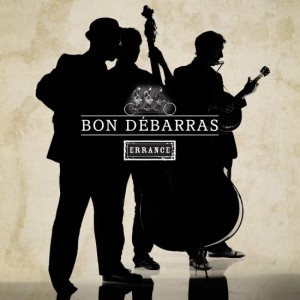And because I’ve managed to go more than five minutes around here without talking about Quebecois music, let’s correct that little problem, shall we? Because my boys of Genticorum have just put out a shiny brand new album, and if you have any interest in Quebecois trad whatsoever…. actually, chances are you already know about this album and you probably even heard about it before I did! But that said, if you’re one of my readers and you’ve seen me enthusing over Quebec trad and you want to check it out for the first time, you could do a hell of a lot worse than picking up Enregistré Live.
When it comes to Quebec trad, okay yeah, I gravitate to the powerhouse bands. Give me Le Vent du Nord and their hurdy-gurdy goodness, or La Bottine Souriante and the sheer unmitigated awesome of their entire horn section. Or the Charbonniers, who pull off the impressive feat of matching La Bottine in power with nothing more than five voices and ten feet. Genticorum is subtler and more deft than these groups in some ways, though, and not just because a flute being one of their primary instruments contributes a certain delicacy of style. This manifests as well in the swift, light podorythmie from fiddler Pascal Gemme, the nimble guitar from Yann Falquet, and the delivery of their vocals.
Did I mention this is Genticorum’s first live album? Since I’ve had the distinct pleasure of seeing them in concert, I was particularly excited about picking this album up. I wanted to see if it captured the energy of the concert I’d previously experienced, and I wasn’t disappointed in the slightest. The between-song intros are minimal, so if you don’t speak French, or if you have enough to follow song lyrics but not stage intros, there won’t be much to interrupt the music for you. (For me, though, I also quite enjoy trying to figure out what the boys are saying about the songs–it’s an excellent way to practice French if, like me, you’re learning!)
Because of course, the songs are the point of the album. There are a couple of tracks here that were familiar to me from the studio albums I’d bought, like the dextrous “La brunante”, where Alexandre de Groisbois-Garand shines on his flute. And the big closer, “La chasse”, is one of my repeat play tracks from their very first album; this is a particularly awesome one since the boys are in high form, and they get the audience going too. The very last track, presumably an encore, was also familiar to me–but because I’d encountered it before on a Galant, Tu Perds Ton Temps album! “La valse turluttée” worked very well by the Galant girls as a complex a capella piece, but it works splendidly here with Alexandre’s flute too.
Of the tracks I didn’t recognize going in, I particularly liked “La finno-gaspésienne”, another deft instrumental; “Déline”, featuring lovely vocals, and especially “La rouillette”, another vocal number, but one which gives each of the boys a chance to sing lead (and Pascal to delightfully milk the hell out of his turn), and which has fun overall structure as a song. (And you can find this one on YouTube! Clickie!)
The album’s not released in the States yet, so right now your options I’m aware of for getting your hands on it are Amazon US, Amazon CA, Archambault in Quebec, Reynaud-Bray in Quebec, and the Canada iTunes store.
But I’d strongly encourage you to keep an eye out on their website for further updates! Or follow them on Twitter or on Facebook. And tell them Anna sent you!
ETA: Bonjour, all you Genticorum fans! Gracious, a lot of you have found this post.

